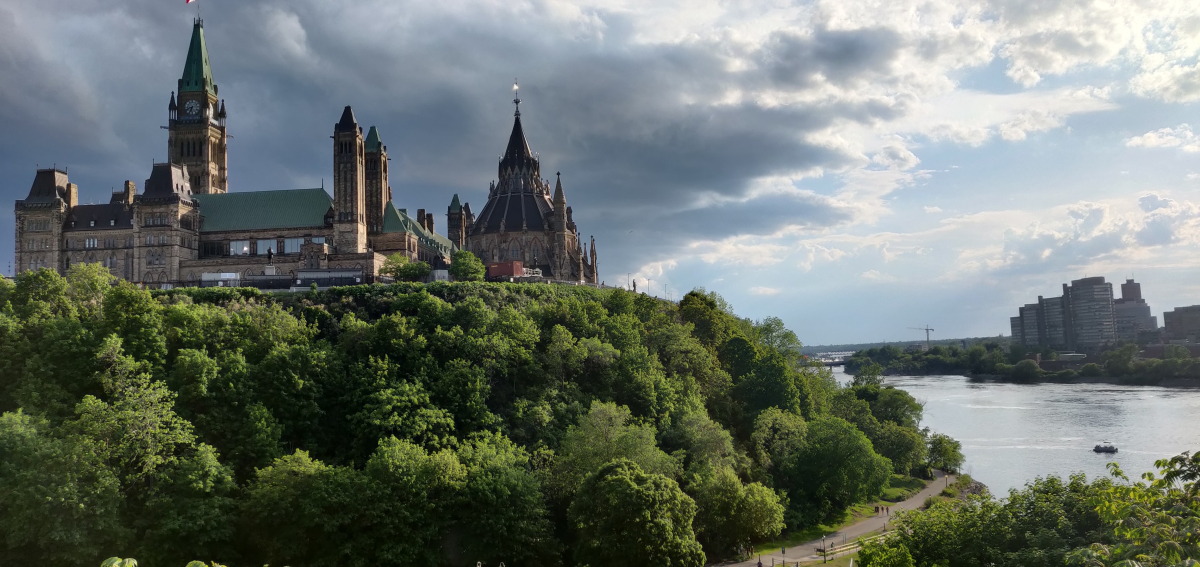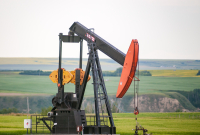Support strong Canadian climate journalism for 2025
At Thursday night’s debate, Liberal Leader Justin Trudeau was hit from all sides for setting ambitious climate goals and failing to deliver, and it’s an open question whether his defence will convince voters.
In April, Trudeau announced Canada’s updated 2030 greenhouse gas emission target would be 40 to 45 per cent below 2005 levels –– a steep drop given the country has only managed to budge emissions down one per cent from 2005 levels so far.
NDP Leader Jagmeet Singh and Conservative Leader Erin O’Toole both accused Trudeau of not delivering on climate action, while Trudeau countered that he’d inherited leftovers from Stephen Harper’s government, which “did not believe in the fight against climate change.”
“We had a lot of catching up to do, but what we were able to do in six years is put a national price on pollution ... and right now, we are on track to exceed the 2030 targets that were set at the beginning of Paris,” Trudeau said.
O’Toole said Trudeau “has never made a target,” adding that his “great ambition” isn’t matched by achievement. Singh agreed.
“You can't say Trudeau hasn't met his target, because it's not 2030,” says Louise Comeau, director of climate and energy with the Conservation Council of New Brunswick. “The evaluation is (how) you put in place the conditions to meet the target.”
The four cross-country parties at the debate all have a climate target in mind. The Conservative promise is a 30 per cent reduction by 2030. The Liberals are pledging 40 to 45 per cent. The NDP says it can hit 50 per cent, while the Green Party has an ambitious 60 per cent target.
The 30 per cent target is what Canada first committed to under the Paris Agreement, but it is a far cry from the country’s fair share, estimated to be around 60 per cent. The IPCC’s landmark 1.5 C report said to maintain global warming to 1.5 C, the world would have to cut emissions by 45 per cent relative to 2010 levels.
“What Trudeau did was he grabbed what the IPCC said in terms of the global average required, and said that's a science-based target, and we're going to aim for that,” said Comeau.
“Let me tell you, for a country like Canada to get 40 to 45 per cent, given the fact … many governments (have) allowed the oil and gas sector to grow, is a heavy lift,” she added.
Comeau said the political reality in Canada, with Alberta desperate to get its oil to market, leaves Trudeau in a bind.
“From a science point of view, we should be shutting down the oilsands. From a country point of view, let's get a grip,” she said. “I can be committed to getting to where we have to be in terms of no oil and gas use in our economy, but at the same time, I'd like the country to hold itself together while we do it.”
Isabelle Turcotte, director of federal policy with the Pembina Institute, said that with COP26 on the horizon, Canada “cannot show up and say we’re going to do less.”
“It matters a lot that we have one party that is committing to reducing the current targets, while we have other parties that are maintaining the 40 to 45 per cent, or going even higher,” she said
O’Toole justified setting his target lower than what Canada has already committed to under Paris by billing it as realistic and achievable.
Turcotte asked what the value is in setting a low target just so you can claim success.
“We're talking about the long-term prosperity of a nation here, we're not talking about the personal report card of a party,” she said.
Comeau echoed the concern, calling the Conservative plan “ridiculous.”
“It's ridiculous in the face of the science, (and) it's ridiculous in the face of the delay it will cause in terms of our transition,” she said.
None of the climate experts were about to let Trudeau’s Liberals off the hook, though.
Turcotte said the recent Liberal promise to cap oil and gas emissions is an example of a critical step that wasn’t taken in the past six years. Comeau said there are political challenges that tie Trudeau’s hands somewhat, but if the government was aligned with science, it would move more aggressively to phase out the oilsands.
Amara Possian, Canada campaigns manager with climate group 350, was blunter in her assessment.
“Justin Trudeau has had six years to tackle the climate emergency … and when we look at the promises he makes for the future, we also have to look at his track record. And his track record on climate is brutal,” she said.
Possian said as the country’s leader, Trudeau has had the opportunity to shape the debate, and did not seize the opportunity to put the type of measures that are needed on the agenda.
“Right out the door, he could have said we need these big and bold solutions to meet this moment, we need to make sure we don't leave workers behind, especially rural and Indigenous communities, and so this is our plan,” she said. “But he put all of his eggs in the carbon tax basket and tied himself to this idea we need pipelines in order to transition to a green economy.
Comeau says there’s a tremendous amount of inertia to overcome and that six years isn’t as much time to bend emissions as some might think.
“We've had a huge amount of momentum towards emissions increasing because Harper decided he was going to make us an energy superpower,” she said, adding it takes years to develop legislation, set regulations, set targets, negotiate with other parties, pass it through Parliament, and then have people comply.
John Woodside / Local Journalism Initiative / Canada's National Observer







Comments
“I can be committed to getting to where we have to be in terms of no oil and gas use in our economy, but at the same time, I'd like the country to hold itself together while we do it.”
We can't let one province — Alberta — hold the rest of the country hostage on climate action.
No amount of appeasement will win Alberta over. The fossil fuel dinosaurs will have to be dragged kicking and screaming into the 21st century.
Ignore the separatist rhetoric. Alberta has no fossil fuel future, either within Canada or as a separate state. Alberta's only future lies with economic diversification within Confederation.
I guess any "science-based target" is better than nothing. But "Everyone Else" is using 1990 as the base year, not 2005.
To the Liberals, "curbing emissions" is just a shell game of bad arithmetic and illegitimate assumptions (again, all in line with CAPP's wet dreams) ... last I heard, it amounted to increasing production, while crowing about theoretical "carbon intensity" reductions, and continuing to misrepresent especially methane emissions, not to mention counting China's "carbon savings" as our own, should they be coaxed to take tarsands oil to reduce coal consumption (and presumably, production).
If I'm not mistaken, it was Barry Saxifrage who contributed some excellent graphics demonstrating carbon emissions vs goals, some time ago. Maybe Mr. Trudeau needs a subscription to National Observer.
Of course Trudeau's faced "political challenges." But he's a politician. Meeting them's what he's supposed to be good at.